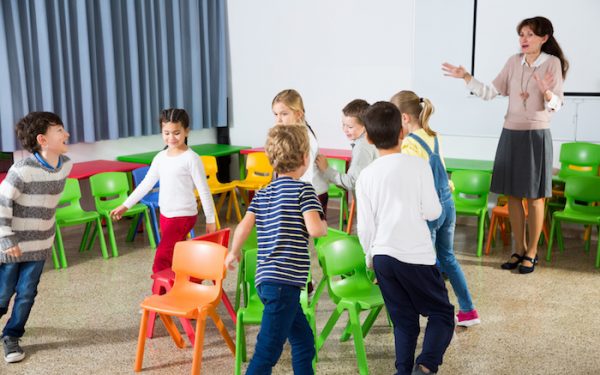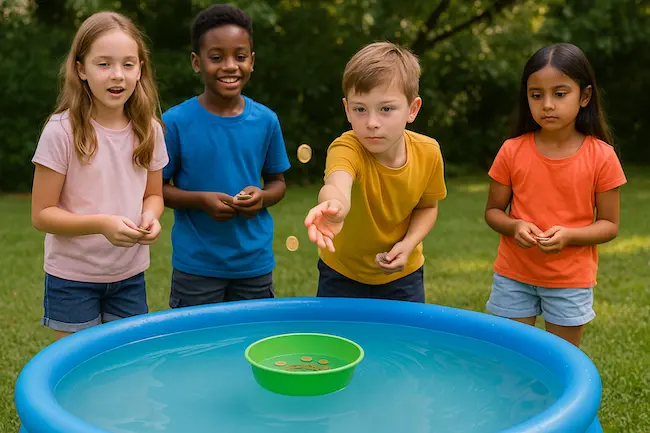The Who Is Telling the Truth? game is a lively social activity where kids share surprising facts about themselves and try to outsmart their friends through clever questioning. This classic guessing game encourages interaction, confidence, and critical thinking—all while creating big laughs and memorable moments. Whether you’re planning a birthday party, a classroom activity, or a rainy-day game at home, this easy setup makes it a perfect choice for children who enjoy games that mix storytelling and deduction.
As an early childhood educator who has used this game many times with children, I recommend it for its ability to spark conversation, develop communication skills, and help kids bond naturally.
Game sheet
Before starting the Who Is Telling the Truth? game, it’s helpful to gather the essential details in one place so adults can organize the activity smoothly. Here’s everything you need to know at a glance.
- Number of players: 6 or more
- Recommended age: From 6 years old
- Materials: Paper and pencils
- Where to play: Indoors or outdoors
- Game length: About 15 minutes
This game requires almost no preparation and adapts easily to small or large groups, making it suitable for families, teachers, and party hosts looking for an engaging activity.
For a lively indoor ice-breaker, check out our dynamic Medusa eye-contact challenge game and pair it with some of our group communication favourites.
How to Play Who Is Telling the Truth?
To make sure the game flows smoothly, it’s important to follow a clear structure with simple steps. Below is a step-by-step explanation that works perfectly with children from age six and up.
- Ask each child to write three personal facts about themselves on a sheet of paper. These facts should be unknown to the rest of the group. They also write their name at the top.
- Collect all the sheets and randomly choose three of them. Call the three corresponding children to the front.
- Read one of the facts aloud. All three children pretend the fact is theirs and must keep a straight face.
- Let the group ask questions. Each child in the audience may ask at least one question to one of the three participants.
- After questioning, the group votes to identify who is telling the truth.
- Reveal the correct child, then repeat the game with three new participants.
This structure keeps the game dynamic, fair, and easy to manage, while giving every child a chance to participate.
If you need a light-hearted activity to energize any group, try our hilarious Laughing Contest party challenge, which always gets kids giggling in seconds.
Game Variations
To keep Who Is Telling the Truth? fresh and exciting, you can adjust the rules or add playful twists. These variations help extend the activity and maintain engagement during parties or classroom sessions.
- The Actor Mode: Children must answer every question in character, adding humor and creativity.
- Speed Challenge: Limit the questioning time to two minutes for a faster, more intense round.
- Theme Round: Ask kids to write facts based on a topic—school memories, animals, sports, or holidays.
- Double Bluff: Let two children tell the truth while one lies, increasing the difficulty for older players.
By switching formats, you can adapt the game to mixed-age groups and different social settings.
To help children warm up and connect in a playful way, we recommend our interactive Move and Mingle movement game for kids, perfect for birthdays or group sessions.
Why Your Kids Will Love Playing Who Is Telling the Truth
Children love this game because it mixes storytelling, mystery, and social play in a fun and welcoming environment. It encourages them to express themselves while guessing the hidden truth behind their friends’ stories.
- Kids enjoy sharing surprising or funny facts about themselves
- The game builds anticipation as everyone tries to spot the real storyteller
- Children feel empowered when they ask clever questions
- The activity encourages positive interaction and boosts confidence
- Even shy kids often open up thanks to the friendly, humorous atmosphere
Because it combines thinking and laughter, this game becomes an instant favorite during parties or playdates.
A great way to boost cooperation and concentration, try our engaging Back-to-Back Drawing partner game for children, designed to spark creativity and teamwork.
Educational Benefits
To fully appreciate the value of Who Is Telling the Truth?, it helps to look at the wide range of skills children naturally develop while playing. This game supports essential learning goals in a simple, enjoyable format.
- Language and expression: Kids practice forming clear questions, explaining their reasoning, and expressing ideas with confidence.
- Critical thinking: Players compare answers, analyze inconsistencies, and evaluate clues to identify the truth.
- Active listening: Children learn to listen attentively to others’ words, tone, and details to avoid missing key information.
- Social awareness: The game encourages kids to observe facial expressions, body language, and behavior cues.
- Group cooperation: Teams work together to reach a shared conclusion, reinforcing teamwork and communication.
- Self-confidence: Being questioned and answering in front of peers helps children develop assurance and public-speaking ease.
- Rule-following: Players learn to respect turns, stay within the structure of the game, and play fairly.
By offering so many developmental advantages in a playful, low-pressure setting, this game becomes both an enjoyable activity and a meaningful learning tool.
FAQ – Who Is Telling the Truth?
Before organizing the game, adults often have a few practical questions about how to adapt it to different ages and settings. This FAQ summarizes the most common concerns with clear, easy-to-follow answers.
Short, simple facts that others don’t know—such as hobbies, experiences, or fun personal details—work best.
Three facts per child allow variety without overwhelming the game.
Yes. The role-playing format helps them participate in a safe, low-pressure way.
Definitely. It’s great between louder activities and helps children bond quickly.
For older groups, increase the difficulty by adding lies, themes, or timed rounds.
By reviewing these common questions, adults can plan the game with confidence and adapt it to their group.
For even more activities that build social interaction and confidence, take a look at our expanded selection of communication-based group games designed for children of all ages.
Designed for Learning and Fun
At Party Games for Kids, our mission is to help adults create moments of connection, discovery, and joyful play through simple, ready-to-use group activities. Each game is selected with care to support children’s development while making life easier for parents, teachers, and activity leaders.
Here’s what defines all the games featured on our site:
- Easy, family-friendly ideas: Every activity is simple to organize and uses familiar materials.
- Games for all ages and group sizes: Whether it’s a playdate, a classroom, or a birthday party, our selection adapts to your needs.
- Meaningful skill-building: The games encourage communication, problem-solving, social interaction, and imagination.
- No-stress setup: Activities require minimal preparation, making them practical for busy adults.
- Screen-free fun: We focus on real interaction and cooperative play to create memorable experiences.
By exploring our collection, you’ll find everything you need to turn any gathering into a moment of playful learning and shared laughter.
If you’re looking for ready-to-use printable adventures, explore our complete collection of kid-friendly mystery and treasure hunt games to organize unforgettable parties with zero prep.






